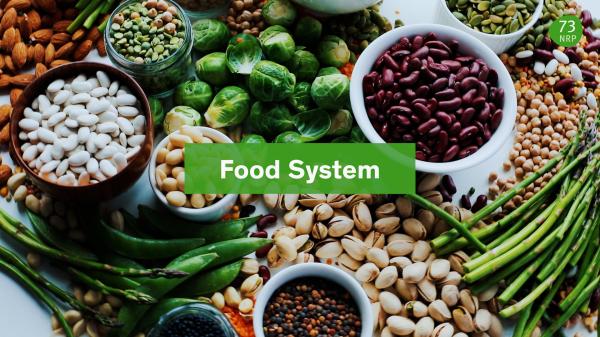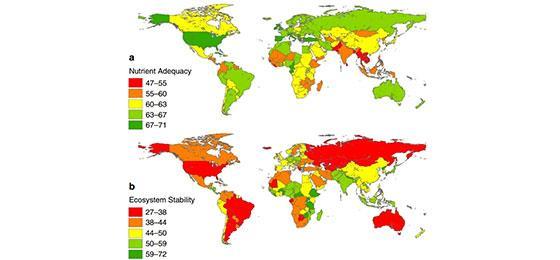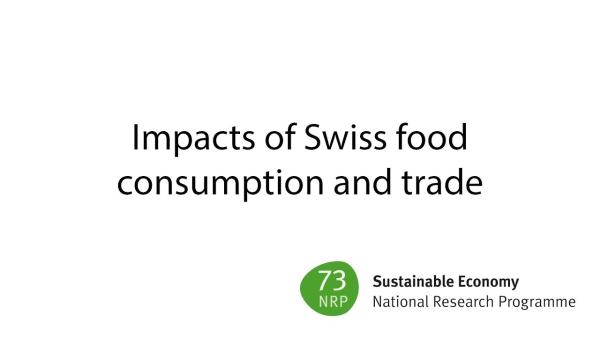Impacts of Swiss food consumption and trade
In a world with limited resources and an increasing population, a transition towards sustainable dietary patterns and a reduction in food waste is needed. Global and national efforts to optimise food systems, can significantly contribute towards the achievement of the Sustainable Development Goals of Agenda 2030.

Background
Global food demand will increase by approximately 70 percent by 2050. Agriculture and food production have the greatest impacts on resource use and environmental sustainability. In addition, diet-related illnesses are the most common cause of health impairments and death. Ensuring adequate nutrition while minimising environmental impacts, is thus becoming an ever-greater challenge. Food systems around the world face this increasing challenge to meet human nutrition needs in sustainable ways.
Aim
We aimed at developping a new framework that combines a multi-indicator-based environmental impact assessment with a nutritional quality assessment in order to evaluate the sustainability of national food systems.
Results
This project first presents a global-scale analysis quantifying the sustainability status of national food systems with 25 indicators across seven metrics. No country can claim to have perfectly sustainable food systems. Switzerland, like most high-income countries, scores well on most social indicators, but poorly on environmental, food waste and health sensitive nutrition indicators. Low-income countries have low per-capita food related environmental footprint but perform poorly in nutrition and social indicators.
Next, our scenarios analysis of Swiss dietary changes shows the magnitude of possible benefits for Switzerland regarding the environmental, health, and economic impact if it transits towards sustainable dietary patterns. A shift from the current Swiss average diet to a healthy diet following the guidelines of Swiss society of nutrition (https://www.sge-ssn.ch/) is projected to result in 36% lesser environmental footprint, 33% lesser expenditure, and 2.7% lower diet-related health risk. A shift to the vegetarian and vegan diet scenarios might lead to a reduction in intakes of certain micronutrients currently supplied primarily by animal-sourced foods (Vitamin B12, Choline, and Calcium).
The assessment of global food waste shows that a global average of 65 kg of food is wasted per year per person. This amount of food waste could provide a healthy diet for one person for 18 days in terms of the 25 nutrients considered in our analysis. The embedded environmental footprints in an average person's daily food waste are 124 g CO2 eq., 58 liter freshwater use, 0.36 m2 cropland use, 2.90 g nitrogen and 0.48 g phosphorus use. Different countries have widely varying nutrients and environmental footprints embedded in their food waste entailing country-specific dietary habits and waste reduction interventions. High-income countries waste six times more food per capita than low-income countries, and the embedded environmental impacts are ten times higher than in low-income countries.
Finally, on the level of individual comestibles, our nutritional combined environmental impact assessment provides a useful tool that links the aggregated nutritional value, such as the nutrient balance score, with LCA analysis to simultaneously evaluate the nutrient density per unit sustainability of food products.
Implications for research
Results from our study show that food system metrics employed to measure the current or future sustainability status should be intrinsically holistic and capable of detecting trade-offs across different economic, environmental, and social elements. The results contribute to the existing efforts on investigating dietary choices and food waste across the globe.
Our project can provide templates and quantifiable tools for conducting sustainability-oriented food studies in other settings.
Implications for practice
Our nation-specific quantitative analysis can help policy-makers set improvement targets on specific areas and adopt practices while tracking all other sustainability indicators. The multi-indicator approach allows to evaluate the impact of alternative strategies aimed at a particular aspect, while at the same time monitoring the impact on other food system metrics. The holistic analysis demonstrated in our project thus contributes to advancing the sustainability evaluation framework. It provides insights into the potential impact of interventions intended to improve both human and planetary health.
Publications
Project leaders
Prof. Dr.-Ing. Alexander Mathys
Institute of Food, Nutrition and Health, ETH Zürich
Project partners
MIGROS
Pulse Canada



